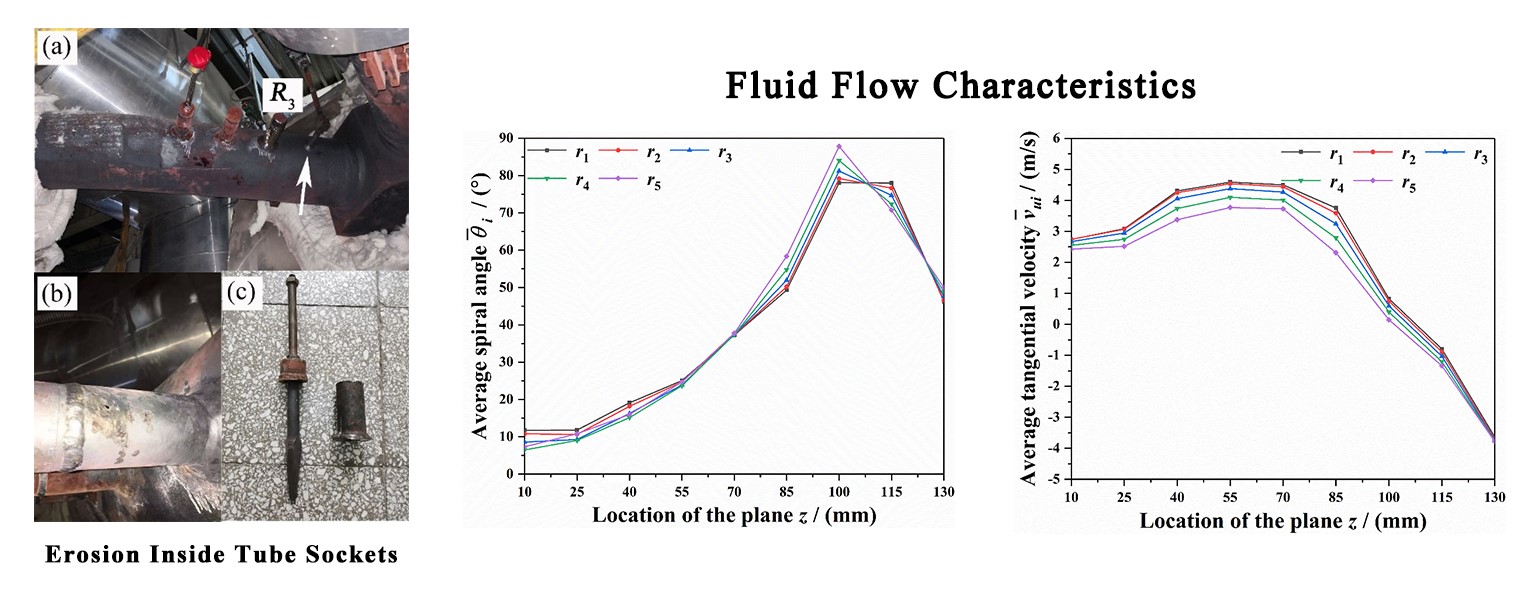 Open Access
Open Access
ARTICLE
Numerical Analysis of the Erosion Mechanism inside the Tube Sockets of Main Steam Thermometers in a Coal-Fired Power Plant
1 School of Energy Power and Mechanical Engineering, North China Electric Power University, Baoding, 071003, China
2 Guohua Sanhe Power Generation Co., Ltd., Langfang, 065200, China
* Corresponding Author: Fan Yang. Email:
Fluid Dynamics & Materials Processing 2023, 19(2), 379-397. https://doi.org/10.32604/fdmp.2022.020373
Received 19 November 2021; Accepted 01 April 2022; Issue published 29 August 2022
Abstract
Leakage occurring in the tube sockets of the main steam thermometers can seriously threaten the safe operation of coal-fired power plants. Here, assuming a 300 MW unit as a relevant testbed, this problem is investigated numerically through solution of the equations of fluid-dynamics in synergy with the mathematical treatment of relevant statistics. The results indicate that the steam can form a large-scale spiral flow inside the tube socket and continuously scour the inner wall. In the model with the protective casing setting angle of 60°, the average tangential fluid velocity can reach up to 4.8 m/s, which is about twice higher than that in the model with the protective casing setting angle of 0°. The wake disturbance generated by the flow around the thermo-sensitive body leads to differences in the fluid motion inside the tube sockets between the upstream and downstream thermometers. These differences are affected by the distance between the thermometers, the setting angle of protective casing, and other factors. The pressure of the main steam inside the tube socket for a R3 thermometer, located outside the curved pipeline, is about 1756 Pa higher than that of the L3 thermometer located outside the straight pipeline, indicating that the secondary flow generated in the curved pipeline is able to provide stronger energy for the large-scale spiral flow inside the tube socket. On the basis of these findings, an improvement scheme for the installation of longitudinal ribs in the tube sockets is proposed. The simulation results show that the average tangential velocity of the fluid within the near-wall area of tube sockets decreases by more than 90%, which should be enough to effectively alleviate the damage to the inner wall caused by high-pressure fluid or particles.Graphic Abstract

Keywords
Cite This Article
 Copyright © 2023 The Author(s). Published by Tech Science Press.
Copyright © 2023 The Author(s). Published by Tech Science Press.This work is licensed under a Creative Commons Attribution 4.0 International License , which permits unrestricted use, distribution, and reproduction in any medium, provided the original work is properly cited.


 Submit a Paper
Submit a Paper Propose a Special lssue
Propose a Special lssue View Full Text
View Full Text Download PDF
Download PDF Downloads
Downloads
 Citation Tools
Citation Tools